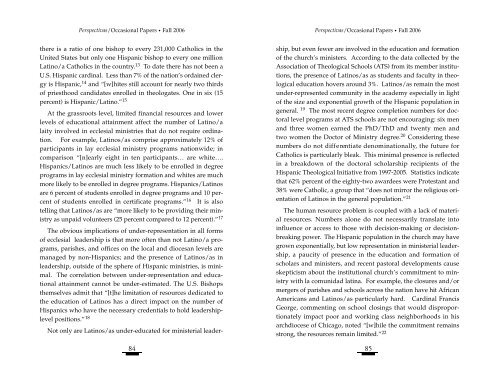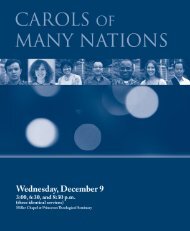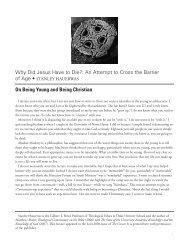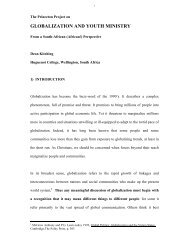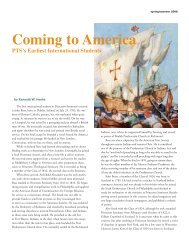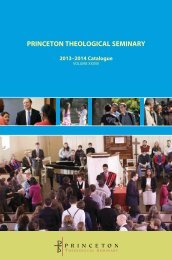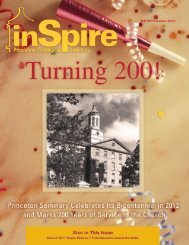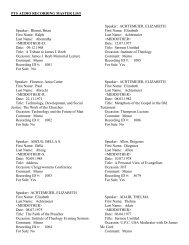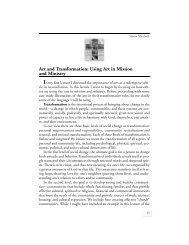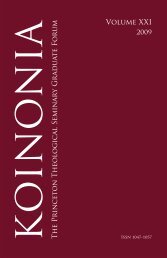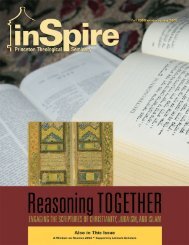P E R S P E C T I VAS - Princeton Theological Seminary
P E R S P E C T I VAS - Princeton Theological Seminary
P E R S P E C T I VAS - Princeton Theological Seminary
You also want an ePaper? Increase the reach of your titles
YUMPU automatically turns print PDFs into web optimized ePapers that Google loves.
Perspectivas/Occasional Papers • Fall 2006Perspectivas/Occasional Papers • Fall 2006there is a ratio of one bishop to every 231,000 Catholics in theUnited States but only one Hispanic bishop to every one millionLatino/a Catholics in the country. 13 To date there has not been aU.S. Hispanic cardinal. Less than 7% of the nation’s ordained clergyis Hispanic, 14 and “[w]hites still account for nearly two thirdsof priesthood candidates enrolled in theologates. One in six (15percent) is Hispanic/Latino.” 15At the grassroots level, limited financial resources and lowerlevels of educational attainment affect the number of Latino/alaity involved in ecclesial ministries that do not require ordination.For example, Latinos/as comprise approximately 12% ofparticipants in lay ecclesial ministry programs nationwide; incomparison “[n]early eight in ten participants… are white….Hispanics/Latinos are much less likely to be enrolled in degreeprograms in lay ecclesial ministry formation and whites are muchmore likely to be enrolled in degree programs. Hispanics/Latinosare 6 percent of students enrolled in degree programs and 10 percentof students enrolled in certificate programs.” 16 It is alsotelling that Latinos/as are “more likely to be providing their ministryas unpaid volunteers (25 percent compared to 12 percent).” 17The obvious implications of under-representation in all formsof ecclesial leadership is that more often than not Latino/a programs,parishes, and offices on the local and diocesan levels aremanaged by non-Hispanics; and the presence of Latinos/as inleadership, outside of the sphere of Hispanic ministries, is minimal.The correlation between under-representation and educationalattainment cannot be under-estimated. The U.S. Bishopsthemselves admit that “[t]he limitation of resources dedicated tothe education of Latinos has a direct impact on the number ofHispanics who have the necessary credentials to hold leadershiplevelpositions.” 18Not only are Latinos/as under-educated for ministerial leader-84ship, but even fewer are involved in the education and formationof the church’s ministers. According to the data collected by theAssociation of <strong>Theological</strong> Schools (ATS) from its member institutions,the presence of Latinos/as as students and faculty in theologicaleducation hovers around 3%. Latinos/as remain the mostunder-represented community in the academy especially in lightof the size and exponential growth of the Hispanic population ingeneral. 19 The most recent degree completion numbers for doctorallevel programs at ATS schools are not encouraging: six menand three women earned the PhD/ThD and twenty men andtwo women the Doctor of Ministry degree. 20 Considering thesenumbers do not diff e rentiate denominationally, the future forCatholics is particularly bleak. This minimal presence is reflectedin a breakdown of the doctoral scholarship recipients of theHispanic <strong>Theological</strong> Initiative from 1997-2005. Statistics indicatethat 62% percent of the eighty-two awardees were Protestant and38% were Catholic, a group that “does not mirror the religious orientationof Latinos in the general population.” 21The human resource problem is coupled with a lack of materialresources. Numbers alone do not necessarily translate intoinfluence or access to those with decision-making or decisionbreakingpower. The Hispanic population in the church may havegrown exponentially, but low representation in ministerial leadership,a paucity of presence in the education and formation ofscholars and ministers, and recent pastoral developments causeskepticism about the institutional church’s commitment to ministrywith la comunidad latina. For example, the closures and/ormergers of parishes and schools across the nation have hit AfricanAmericans and Latinos/as particularly hard. Cardinal FrancisGeorge, commenting on school closings that would disproportionatelyimpact poor and working class neighborhoods in hisarchdiocese of Chicago, noted “[w]hile the commitment remainsstrong, the resources remain limited.” 2285


